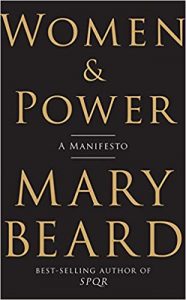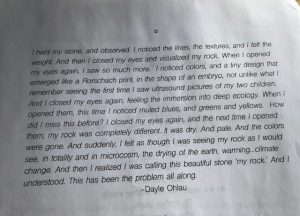‘This is how human power can look.’
February 27, 2020“That idea that power cannot be accompanied by notions of compassion and kindness and empathy. That’s something that I refuse to accept.”
‘Picture a leader of a country and, chances are, you’ll picture a man.
This isn’t surprising. The majority of world leaders are men, so our ideas about the characteristics of leadership are so deeply ingrained, it’d take someone pretty outstanding to change them.
Far-right, ‘strongman’ rulers are on the rise around the world. But not in New Zealand, where Jacinda Ardern, the 39-year-old progressive prime minister, is challenging perceptions of what a leader should look like and showing us that society is ready for change.
This prime minister is showing the world that leadership isn’t a male trait. It’s a human one
Imagine a powerful person. The prime minister of a rich country, say, taking the stage for a press conference. Think of the voice, the dress sense, the way a prime minister speaks and sounds. Who do you see in front of you? Let me guess.
A man in a suit.
This is our reflex, our stock idea of a prime minister. It’s an image that plays tricks on many female politicians. Take Senator Elizabeth Warren, a prominent candidate in the Democratic primaries to select a challenger to Donald Trump, the US president, in elections in November this year. After a promising start in autumn 2019, Warren’s campaign has been plagued by loud speculation about her “electability”. She’s a woman, after all.
According to Warren, her rival Senator Bernie Sanders told her during a private conversation in 2018 that a woman can’t win in 2020. It’s a claim that Sanders has denied, but the grounds for such opinions are easy to find. In the 2016 presidential race, Hillary Clinton fought Trump in a tough, often sexist campaign. For all her political experience, the word went around that a woman was not “presidential” and hence not “electable”. The same assumptions have hurt Warren’s campaign.
Governments in Hungary, United States and Brazil are led by macho misogynists. In New Zealand, the opposite happened.
Is it credible in 2020 that women are still not electable to the highest level of power? If you follow the news, you’ll understand the roots of this question. Trump won in 2016 despite – or perhaps, thanks to? – numerous accusations of sexual misconduct and an audio recording of his infamous “Grab ’em by the pussy” comment during a tour of a television studio in 2005.
In New Zealand, the exact opposite happened.
Since 2017, the New Zealand government has been led by a woman who is still (until July) under 40 years old. Ardern’s victory can be compared to other recent political insurgents Barack Obama, Justin Trudeau and Emmanuel Macron.
It is a measure of international interest that “Jacindamania” has entered the political lexicon. At the same time, however, the same political climate has rained hatred upon Ardern. Her personal style has upset millennia-old ideas about men, women and power: ideas made visible by the sexist reactions which follow her.
The phenomenon of New Zealand’s second female prime minister shows how the prevalence of these ingrained cultural ideas and, thanks to Ardern and others, how such thinking can shift.
Her message is that people depend on one another – not on money, numbers or achievements.
[…]
Mary Beard, a British classicist, cites this incident in her 2017 book Women & Power, a history of misogyny from Athens and Rome to today. She begins with an account of Homer’s Odyssey, in which Queen Penelope, wife of Ulysses, is silenced in public by her newly grown-up son because “speech is a man’s business”. To Roman orators, high (female) voices expressed “cowardice”. For too many famous novelists, female voices resembled the mooing of cows or the braying of donkeys, sounds which polluted language.
Sharp, too high, unpleasant – the voices of female politicians or leaders would have ‘no authority’
Beard’s book describes a serial smear campaign against the female voice. She shows how prevailing ideas about eloquence and rhetoric are rooted in a classical tradition which dismissed female voices as an aberration. To this day, women are much more often said to be squeaking, whining, squawking, screaming or cackling. Or that their voices are “just uncomfortable” to hear. Like Warren’s, described by a journalist as “unbearably shrill”.
Preserve our light.
‘Sun can no longer shine through these windows because taller buildings now surround it.’ -History Lovers Club
‘…feelings that defy language.’
‘If a man has to be pleasing to me, conforming, reassuring, before I can love him, then I cannot truly love him. Not that love cannot console or reassure! But if I demand first to be reassured, I will never dare to begin loving. If a man has to be a Jew or a Christian before I can love him, then I cannot love him. If he has to be black or white before I can love him, then I cannot love him. If he has to belong to my political party or social group before I can love him, if he has to wear any kind of uniform, then my love is no longer love because it is not free: it is dictated by something outside itself. It is dominated by an appetite other than love. I love not the person but his classification, and in that event I love him not as a person but as a thing. In this way I remain at the mercy of forces outside myself, and those who seem to me to be neighbors are indeed strangers; for I am, first of all, a stranger to myself.’
-Thomas Merton, Seasons of Celebration, 1965
Pulitzer Prize-winning poet Tracy K. Smith on the purpose and power of poetry
The two-time American poet laureate joins The Ezra Klein Show for a powerful conversation on love, language, and more.
Ezra Klein:
‘It’s the rare podcast conversation on The Ezra Klein Show where, as it’s happening, I’m making notes to go back and listen again so I can fully absorb what I heard. But this is that kind of episode.
Tracy K. Smith is the chair of the Lewis Center for the Arts at Princeton and a Pulitzer Prize-winning poet, and was the two-time poet laureate of the United States from 2017 to 2019. But I’ll be honest: she was an intimidating interview for me. I often find myself frustrated by poetry, yearning for it to simply tell me what it wants to say, aggravated that I can’t seem to crack its code.
Preparing for this conversation, and even more so, talking to Smith, was a revelation. Poetry, she argues, is about expressing “the feelings that defy language.” The struggle is part of the point: you’re going where language stumbles, where literalism fails. Developing a comfort and ease in those spaces isn’t something we’re taught to do, but it’s something we need to do. And so, on one level, this conversation is simply about poetry: what it is, what it does, how to read it.
But on another level, this conversation is also about the ideas and tensions that Smith uses poetry to capture: what it means to be a descendent of slaves, a human in love, a nation divided. Laced through our conversation is readings of poems from her most recent book Wade in the Water, and discussions of some of the hardest questions in the American, and even human, canon. Hearing Smith read her erasure poem, “Declaration” is, without doubt, one of the most powerful moments I’ve had on the podcast.
There is more to this conversation than I can capture here, but to say it simply: this isn’t one to miss, and that’s particularly true if, like me, poetry intimidates you.’
❀
I want to utter you. I want to portray you
not with lapis or gold, but with colors made of apple bark.
There is no image I could invent
that your presence would not eclipse.
-Rilke





